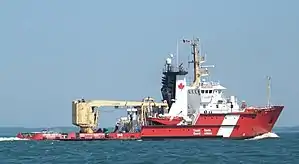
USCGC Obion, a river buoy tender, maintaining navigational buoys on the Ohio River at Louisville, Kentucky.
A buoy tender is a type of vessel used to maintain and replace navigational buoys. This term can also apply to an actual person who does this work.
The United States Coast Guard uses buoy tenders to accomplish one of its primary missions of maintaining all U.S. aids to navigation (ATON).[1]
The Canadian Coast Guard uses multi-use vessels (most being icebreakers) with tasks including buoy tending.[2]
Types of coast guard buoy tenders
.jpg.webp)
Maritime Gendarmerie buoy tender Provence
United States Coast Guard
- 240' USCGC Mackinaw (WLBB-30)
- 225' USCG seagoing buoy tender (WLB)
- 175' USCG coastal buoy tender (WLM)
- 100' USCG inland buoy tender (WLI)
- 100' USCG inland construction tender (WLIC)
- 75' River buoy tender (WLR)
- 75' Inland construction tender (WLIC)
- 65' River buoy tender (WLR)
- 65' Inland buoy tender (WLI)
- 49' Buoy utility stern loading boat (BUSL)
- Other miscellaneous aids to navigation boats

CCGS buoy tender Samuel Risley
Canadian Coast Guard
- 272' CCGS Ann Harvey
- 272' CCGS George R. Pearkes
- 228' CCGS Earl Grey
- 228' CCGS Samuel Risley
- 198' CCGS Alexander Henry
- 180' CGS Aberdeen
- 179' CCGS Simcoe
- 180' CGS Simcoe
- 144' CCGS C.P. Edwards
- 125' CCGS Brant
- 66' CCGS Cove Isle
Further reading
References
- ↑ "Aids to Navigation – Mapping the Waters | GoCoastGuard.com". www.gocoastguard.com. Retrieved 2019-05-06.
- ↑ "Icebreaker Fleet". Canadian Coast Guard. May 6, 2019.
This article is issued from Wikipedia. The text is licensed under Creative Commons - Attribution - Sharealike. Additional terms may apply for the media files.